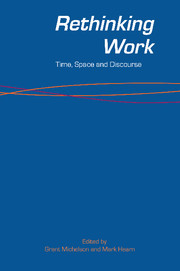PART I - TIME
Published online by Cambridge University Press: 05 June 2012
Summary
How are we to understand the relationship between time and work, at an historical moment when work has placed ever more intense demands on our time, often demands of simultaneous strictness and flexibility? Epstein & Kalleberg capture a sense of these complexities and contradictions, and our subjective relationship with time, when they propose that ‘time, far from being a finite resource, is interpreted, manipulated, and perceived in ways that expedite or impede people's lives’. New technologies have allowed work to consume our time: ‘even going home, employees are wired to the workplace’. Employees may at once feel more autonomous in their performance of work, yet electronically chained to work by email; they may remain ‘highly supervised’ while away from the office, the work/non-work time divide blurred and compromised (Epstein & Kalleberg 2001: 13–14).
The relationship between time and work may also function in insidiously non-linear patterns. Time may be shaped at work to construct identity and reflect the subjectivity of the individual: race, class or gender may determine the ability of the individual to control their work time. A woman asked to perform overtime, ‘whose identity is lodged in her family roles’, may feel a greater sense of ‘conflict and personal denial’ about this request than another woman whose identity is focused around her work. Time may function as a ‘container of meaning’ that reflects social or cultural roles – roles that must often be managed against the time-persistent demands of work (Epstein & Kalleberg 2001: 8–12).
- Type
- Chapter
- Information
- Rethinking WorkTime, Space and Discourse, pp. 17 - 20Publisher: Cambridge University PressPrint publication year: 2006

